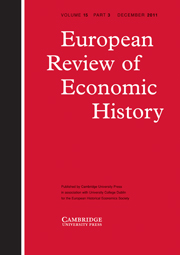Article contents
All that glitters: Precious metals, rent seeking and the decline of Spain
Published online by Cambridge University Press: 02 December 2005
Abstract
I argue that Spain's long-term economic stagnation in the seventeenth century and beyond was the result of a process triggered by the windfall acquisition of precious metals from American mines, and driven by the consolidation of absolutist rule and the peculiar privilege structure of Spanish society in the sixteenth century. American treasure allowed the Spanish monarchs to command large amounts of credit and pursue an expansive imperial policy unlike that of any other Early Modern nation; when the cost of the Empire increased and mineral rents fell, the Crown increased the fiscal pressure while allowing skilled human capital to migrate into the tax-sheltered but largely unproductive nobility. I first provide evidence on the role of the silver windfall and the acquisition of nobility titles in the sixteenth century; of particular interest is a new data series of nobility lawsuits constructed from the population of cases housed at the Archive of the Royal Chancery Court in Valladolid. I then develop a unified theoretical framework that explains imperial policy as an optimal response given the existing institutions and the natural resource windfall, recreates the rent-seeking path followed by the Spanish Crown when mineral rents proved insufficient, and accounts for the long-term economic backwardness that Spain experienced in the following centuries as the result of an institutional lock-in.
- Type
- Research Article
- Information
- Copyright
- Cambridge University Press 2005
- 17
- Cited by




